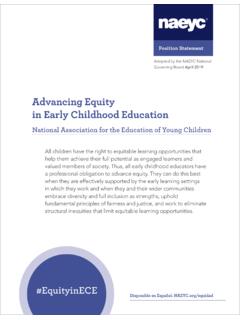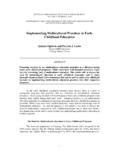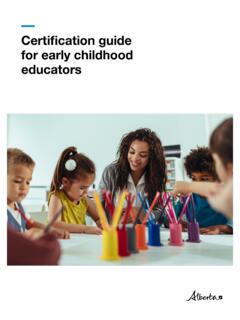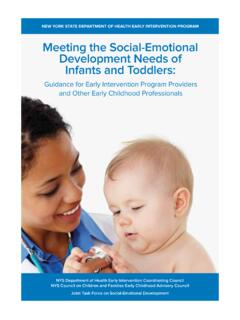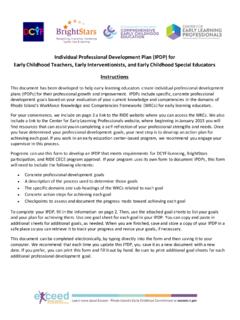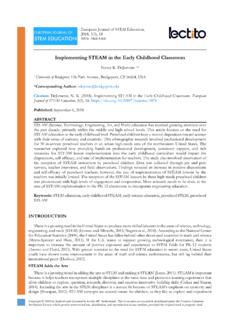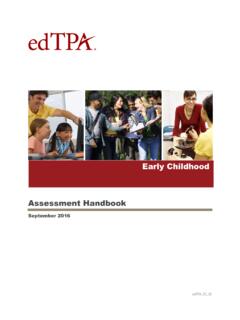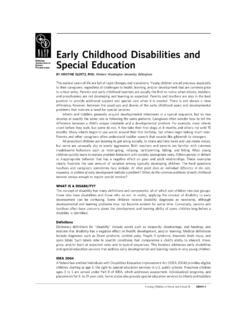Transcription of C de of Pr fessi nal Resp nsibilities and C de of Ethics ...
1 Professionalisation Sub-Group of the early Years ForumCde of Prfessinal Respnsibilities and Cde of Ethics For early Years EducatorsProfessionalisation Sub-Group of the early Years ForumCntentsForeword by Minister for Children and Youth Affairs 2 Code of Ethics for early Years Educators1 in Ireland 41. Introduction by Dr Mary Moloney, Chairperson of the Professionalisation Sub-Group 82. Using the Code of Professional Responsibilities 103. Principles Underpinning the Code of Professional Responsibilities 124. Professional Responsibilities Relating to Children 13 Scenario 1 155.
2 Professional Responsibilities Relating to Parents and Families 16 Scenario 2 176. Professional Responsibilities Relating to Colleagues 18 Scenario 3 197. Professional Responsibilities Relating to Employers 20 Scenario 4 218. Professional Responsibilities Relating to the early childhood Education and Care Profession 22 Scenario 5 239. Professional Responsibilities Relating to Communities 24 Scenario 6 251 Freword by Minister for Children and Youth Affairs As Minister for Children and Youth Affairs, I welcome the publication of the Code of Ethics and Code of Professional Responsibilities for the early learning and care workforce.
3 In 2016, I established a Forum for the early learning and care sector where issues of relevance could be discussed among key stakeholders and to enable consultation and engagement between myself, key Department of Children and Youth Affairs officials and key representatives of the sector. This Forum provides a platform for early learning and care representative groups to have an input into the policy process and to work together through sharing of good practice. This publication is an initiative of the Professionalisation Sub Group (P-SG) of the early Years Forum. The role of the P-SG is to examine the issues that impact on the professionalisation of the early learning and care workforce and to prepare proposals for consideration by the National early Years Forum which relate to the professionalisation of the workforce.
4 Proposals include topics such as sector recruitment, development of a professional body, and a code of Ethics , which I am delighted to see is included in this publication. The P-SG is made up of a range of organisations representing the early learning and care sector. Among the many important developments initiated in recent years to strengthen and underpin early learning and care in Ireland is this joint publication of the Code of Ethics and Code of Professional Responsibilities, which outlines the values and standards expected of the sector s workforce. Both Codes were the subject of an extensive consultation process with early learning and care partners and stakeholders, including the general public, the workforce and interested bodies.
5 This document has been designed by the early learning and care workforce, for the early learning and care workforce, which is a powerful statement. It belongs to the Minister for Children and Youth Affairs, I want these Codes to be more than just words I want the words to be matched by real practice on the ground. I want to see the full implementation of the Code of Ethics and Code of Professional Responsibilities, which I believe will support public trust and confidence in the wish to record my thanks and appreciation to the members of the P-SG of the National early Years Forum for their work on this publication and their wider efforts to support the professionalisation of the early learning and care sector.
6 I also wish to express my gratitude to the women and men who work at all levels of our sector, who action the code of Ethics and code of professional responsibilities every day in supporting Ireland s children grow and develop to their fullest potential. While much of this work on professionalisation remains ongoing, I hope that you will find useful and interesting insights in these Codes that help to place your role in context. We remain determined to build on the progress achieved to date and to continue to deliver accessible, affordable and high quality early learning and care and school-age childcare for children and their families, while also creating an appropriately skilled and sustainable workforce that is supported and Katherine Zappone, MINISTER FOR CHILDREN AND YOUTH AFFAIRS3 Cde of Ethics for early Years Educators1 in IrelandPreambleThis document outlines the values and Ethics underpinning the work of the early years educators regardless of position.
7 It offers to early years educators a set of principles to provide a reference point in guiding day-to-day decision making. The Code of Ethics of early years educators is centred on the rights of the child and the rights of the child s parent/guardian as the natural and first educator of their children. It is also based on S olta, the national quality framework for early childhood education and Aistear, the national curriculum framework for the early years. The early years educators will use this Code of Ethics as a foundation on which to develop policies, procedures and practice. It is designed to be applied in working with children, parents2, services, or within communities.
8 Similarly, in emphasising the professional nature of early childhood education, it respects and encourages the educator s own judgements which are a fundamental part of early years pedagogy. The term early years educator as used in this Code refers to the members of the early childhood education and care profession. Values StatementEarly years educators acknowledge that: Every child is unique and has inalienable rights as set out in the United Nations Convention on the Rights of the Child; early childhood is a significant and distinct time in life that must be valued, respected, nurtured, and supported in its own right;1.
9 The term early years educator as used in this document refers to the members of the early childhood education and care profession. Alternative terms may be used in different settings. The Department of Children and Youth Affairs and the Department of Education and Skills will be carrying out a public consultation on the most appropriate terminology for the profession during 2020. 2. The term parent is used to include parents, guardians and all persons who act in loco parentis . 4 The young child is innately driven to learn and is an active agent in her/his own development through her/his interactions with the world.
10 The young child is a competent and confident learner. early childhood education and care takes place in the context of family, community and culture; Children thrive best in caring and democratic communities; Play is a key means of supporting young children s learning and development. early years educators , in undertaking their roles and tasks, will seek to promote and maintain these values. Principles of early Years Teaching1. The child s individuality, strengths, needs and rights are central in the provision of quality early childhood education and care settings. Children have the right to be listened to and appropriately responded Parents are the primary educators of the young child and have a pre-eminent role in promoting her/his health, well-being, learning and development.
